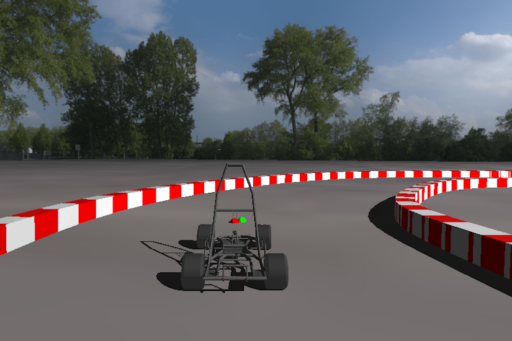Wisconsin Autonomous, a team of University of Wisconsin-Madison students, is among the 10 collegiate teams selected to compete in the AutoDrive Challenge II organized by SAE International and General Motors.
Participating university teams will develop and demonstrate an autonomous vehicle that can navigate urban driving courses as described by SAE J3016 Standard Level 4 automation.
Alex Pletta, leader of Wisconsin Autonomous, says the team is excited to take on this challenge.
 Control algorithm testing for go-kart in simulation using a custom simulation environment with Project Chrono, an open-source physics-based simulation engine being developed by the UW-Madison Simulation Based Engineering Lab.
Control algorithm testing for go-kart in simulation using a custom simulation environment with Project Chrono, an open-source physics-based simulation engine being developed by the UW-Madison Simulation Based Engineering Lab.
“Much of our prior competition experience has been with autonomous racing and primarily designing for high-performance driving,” says Pletta, a senior majoring in mechanical engineering and computer science. “We’re looking forward to the AutoDrive Challenge II so we can build on what we’ve learned to develop solutions that are robust and intelligent for the dense, interactive and uncontrolled environments common to urban driving. Autonomous vehicles are poised to revolutionize the automotive and transportation industries and we’re excited to be a part of the research and innovation driving that forward.”
Throughout the four-year competition, participants are required to meet yearly benchmarks for the design and development of their autonomous vehicle systems, while continuing their education through SAE professional development courses.
To participate in AutoDrive Challenge II, participating universities committed to relevant curriculum, vehicle testing facilities, undergraduate participation, and faculty and graduate student leadership in their proposals. Challenges will present students with real-world applications of sensing technologies, computing platforms, software design and implementation, and advanced computation methods such as computer vision, image processing, machine learning, artificial intelligence, sensor fusion and autonomous vehicle controls.
GM will provide each participating university team a Chevrolet Bolt EUV vehicle; each team will design and integrate its own autonomous vehicle system into the Bolt so that it can navigate an urban driving course as a fully autonomous vehicle. Over the next four years, the teams will meet annually for competitive events at The Mcity Test Facility, located on the University of Michigan Campus in Ann Arbor, Michigan.
Glenn Bower, a mechanical engineering faculty associate at UW-Madison, and colleague Xiangru Xu, a mechanical engineering assistant professor whose research focuses on controlling autonomous systems, are co-advising Wisconsin Autonomous for the competition.
Pletta says Wisconsin Autonomous provides students with valuable hands-on learning opportunities, including transdisciplinary collaboration as students blend fields such as computer science and mechanical and electrical engineering to develop innovative solutions.
“Applying and combining what we learn in courses to hands-on projects takes understanding of those concepts to a whole new level,” Pletta says. “Our team is special because of how we’ve brought together passionate, collaborative students who have superb technical talent and love learning.”
The university teams selected to participate in the AutoDrive Challenge II are:
• Kettering University
• Michigan Technological University
• North Carolina A&T University
• The Ohio State University
• Penn State University
• Texas A&M University
• University of Toronto
• University of Wisconsin–Madison
• Queens University
• Virginia Tech